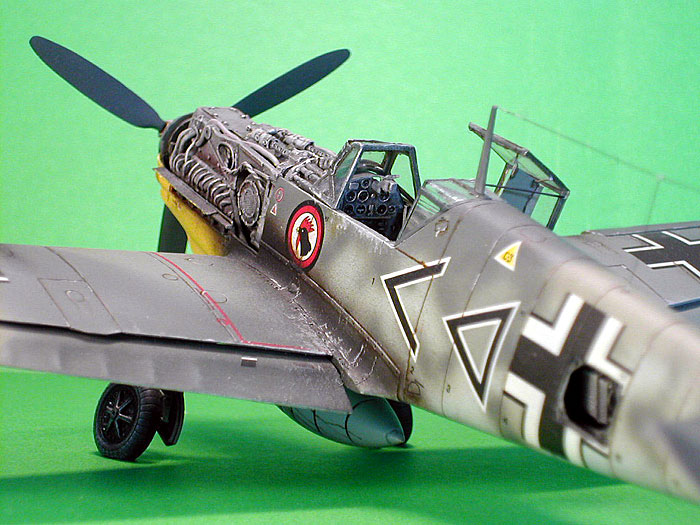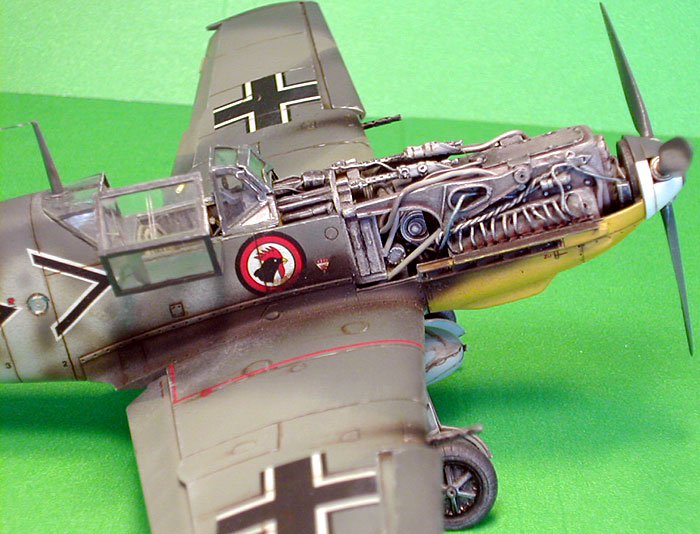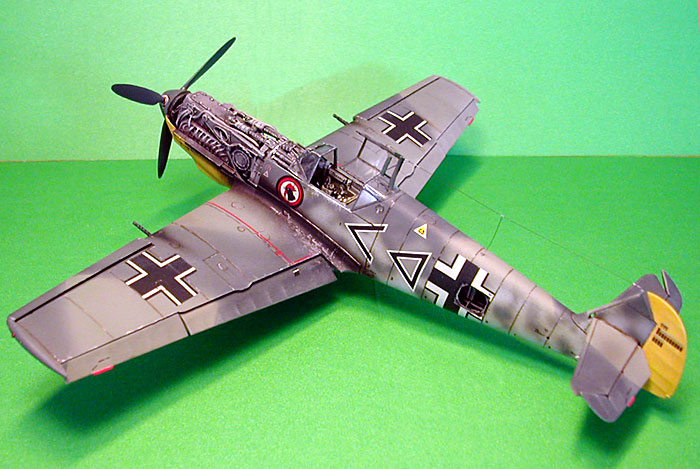|
Messerschmitt Bf 109E-4
by Doowan Lee
|

|
|
Messerschmitt Bf 109E-4 |

HyperScale is proudly supported by
Squadron
This is the Messerschmitt
Bf 109E-4 flown by Hptm. Hans “Assi” Hahn with JG3.
The model is a combination
of the Hasegawa 1/48 Messerschmitt Bf 109E-4/7 kit, the Verlinden Bf 109E
superdetail set, and some scratch-building.
I think the Bf 109E superdetail set is one the best detail sets Verlinden
ever produced. It comes with a detailed and accurate engine, gorgeous
cockpit, radios, rudder controls, PE canopy frames, and a plethora of
small parts. Frankly, I didn’t need any other aftermarket update sets
other than the Verlinden set for this project. On the other hand, it is a
little disappointing that recent Verlinden superdetail sets are not as
complete as its earlier products.

I started with the cockpit. Verlinden’s cockpit had a great deal of
details.
Once painted, washed, and
dry-brushed, it looked great. I especially liked the combination of PE
part and film to accurate represent the instrument panel. Assembled and
painted correctly, it looked gorgeous and sharp. The wheel wells received
some detailing using the PE parts that came with the superdetail set. It
gave the correct look to the wheel well, not the bland flat surface of the
kit. Some of the details around the machine guns are scratch-built using
various spare parts. Looking at the details, I realize there are some
empirical inaccuracies. Wires and tubes were added to the engine, and it
was heavily weathered to reflect the overworked condition of a typical Bf
109E-4. It was really convenient to use the PE frames for the canopy as
opposed to masking/painting. However, due to some miscalculation on my
part, there is a visible gap between the front windshield frame and the
fuselage. Perhaps, I will correct this in time.
The ailerons were separated from the part and reattached to droop. Unlike
the Fw 190, I was informed by Steven Eisenman that on the Bf 109E series,
ailerons could slightly droop, if the flaps are fully lowered. (Thanks
Steven!) At the point of construction, I wasn’t aware of this. I think I
saw a picture of a Bf 190E with both flaps and ailerons lowered, but
frankly the memory of it is rather faint. In any event, it’s nice to be
empirically lucky once in a while.
Brake lines were added to
the landing struts. The antenna wire is my own hair (Good thing I can
still spare some…).
The model was painted as
suggested by the kit’s instructions. Once the basic camouflage was
completely dried, I gave it a thin coat of Future, liquid floor wax. Once
that was dry, I applied the decals that came with the kit.
Everything had a perfect
shape and register. The only drawback was the crosses somewhat lacked
opacity. After a couple of days, I applied another coat of Future for
weathering. Once the coat was completely dry, I somewhat heavily weathered
the model in order to reflect the typical field condition under which
these airplanes operated.

Typically, the 109 series
had a notorious oil leakage problem throughout its production cycle. That
means the underside should significant oil stains. I used a fine brush and
thinned oil paint to simulate the oil leakages. Exhaust stains were
airbrushed using Gunze’s acrylic ‘smoke.’ A couple of flat coats finally
completed the paint job. The signal lights on the wings were first painted
with silver then clear red and blue from Tamiya. I think this method is
much easier than carving, shaping, and painting clear plastic parts.
In summary, both the
Hasegawa kit and Verlinden set were a real pleasure to work with. While
the Hasegawa kit provides an excellent base for additional detailing, the
Verlinden set was well engineered to fit smoothly with the kit.
As for the completed
model, I admit there are a few little mistakes here and there.
Well, next time I will try
the Tamiya counter part and CMK’s 109E engine set to see how that
combination measures up!
Click the
thumbnails below to view larger images:
Model, Images and Text Copyright © 2003
by Doowan Lee
Page Created 28 October, 2003
Last Updated
17 March, 2004
Back to
HyperScale Main Page |
Home |
What's New |
Features |
Gallery |
Reviews |
Reference |
Forum |
Search